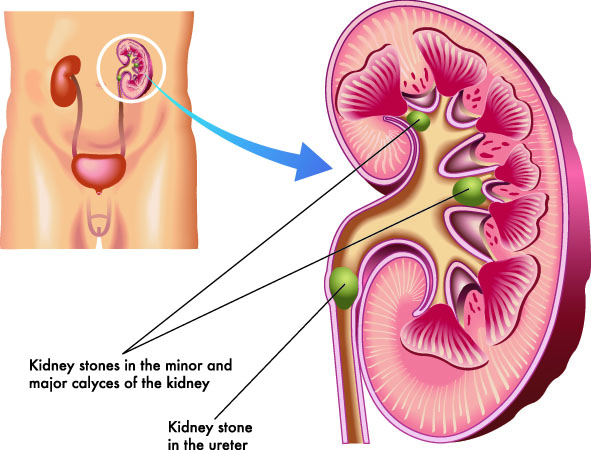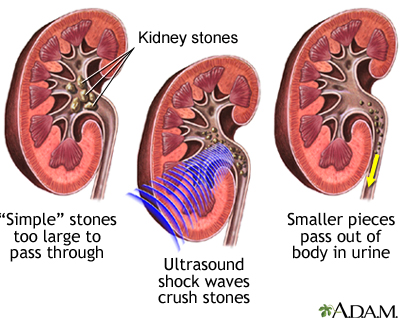Understanding the Secret Distinctions In Between Kidney Stones and Urinary System Infections: An Extensive Summary for Clients
Understanding the distinctions in between kidney stones and urinary tract infections (UTIs) is crucial for clients that might be experiencing similar signs and symptoms yet encounter greatly different wellness challenges. While both conditions can materialize pain in the lower abdomen or back, their hidden causes, analysis methods, and therapy procedures split significantly. A nuanced understanding of these differences not just help in exact self-assessment however likewise notifies discussions with healthcare suppliers. As we explore these essential elements, it comes to be clear that recognizing the distinct qualities of each problem can greatly affect person end results. What may be the very best approach to attending to these distinctions?
Summary of Kidney Stones
The formation of kidney stones, a usually debilitating and excruciating problem, highlights the important importance of maintaining kidney wellness. Kidney stones, also referred to as renal calculi, are strong masses that develop from crystals in the urine. These stones can vary in size from a grain of sand to a golf round and can reside in any kind of component of the urinary system system. The key types of kidney stones include calcium oxalate, calcium phosphate, uric acid, struvite, and cystine stones, each with unique causes and risk elements.
A number of variables contribute to the development of kidney stones. Furthermore, metabolic disorders and particular medical conditions might incline individuals to stone formation.
Signs of kidney stones can include extreme flank queasiness, discomfort, and hematuria, which commonly trigger immediate medical evaluation. Treatment choices vary, ranging from enhanced liquid consumption and dietary modifications to clinical treatments such as lithotripsy or surgical elimination, depending upon the dimension and place of the stones. Comprehending these elements is important for efficient avoidance and administration.
Overview of Urinary System Tract Infections
Urinary system tract infections (UTIs) represent an usual yet substantial health and wellness worry, influencing millions of people every year. These infections take place when microorganisms get in the urinary system, which consists of the kidneys, ureters, bladder, and urethra. Most of UTIs are caused by Escherichia coli, a kind of microorganisms usually located in the stomach tract. While UTIs can influence anybody, they are specifically common in ladies as a result of anatomical differences that promote bacterial access.
The threat aspects for creating a UTI include sex, particular kinds of contraception, urinary retention, and a background of previous infections. Individuals with weakened pre-existing conditions or immune systems, such as diabetes, might likewise be at higher threat. UTIs can be classified right into 2 main kinds: uncomplicated and difficult. Uncomplicated UTIs are normally limited to the bladder and are extra usual in healthy and balanced people, while complex UTIs may include the kidneys and occur in those with underlying health and wellness issues.
Prompt medical diagnosis and treatment are necessary to avoid problems, such as recurring infections or kidney damages (Kidney Stones vs UTI). Commonly, UTIs are treated with prescription antibiotics, and preventive procedures can be used for those with frequent events
Usual Signs And Symptoms Contrast
Symptoms of urinary tract infections and kidney stones can frequently overlap, bring about confusion in diagnosis. Both conditions can provide with discomfort in the lower abdominal area or back, however the nature and place of the discomfort frequently differ. In urinary tract infections (UTIs), patients normally experience a burning sensation throughout peeing, frequent prompts to pee, and gloomy or strong-smelling urine. On the other hand, kidney stones tend to create serious, pain that Website emits from the back to the lower abdominal area and groin, often referred to as colicky pain.
Furthermore, UTIs might be accompanied by high temperature and cools, specifically in a lot more extreme cases, while kidney stones can lead to nausea and vomiting due to extreme pain. While pain throughout peeing is a trademark of UTIs, kidney stones generally provide with even more intense discomfort episodes, which may go and come.
Medical Diagnosis Approaches
Just how can health care professionals properly distinguish between kidney stones and urinary system system infections? The analysis procedure starts with a thorough case history and a thorough review of the client's signs. Medical professionals usually execute a checkup, which may expose inflammation in the abdomen or flank area, leading the diagnostic pathway.
Lab tests play a crucial function in distinguishing between these 2 problems. Kidney Stones vs UTI. A urinalysis can recognize the presence of blood, crystals, or microorganisms, which are indicative of either condition. In instances of urinary system system infections, the urinalysis may reveal a considerable presence of white blood cells and nitrites, while kidney stones might present with particular crystals
Imaging research studies, such as abdominal ultrasound or computed tomography (CT) checks, are necessary for visualizing kidney stones. These imaging strategies enable health care service providers to analyze stone dimension, area, and possible blockages in the urinary system system. On the other hand, urinary system infections normally do not call for imaging unless problems are suspected.
Together, these diagnostic methods encourage health care professionals to precisely detect and distinguish in between kidney stones and urinary tract infections, making certain that clients receive ideal treatment and management.
Therapy Options and Avoidance
While both kidney stones and urinary system infections (UTIs) require timely therapy, their monitoring strategies differ considerably.
The therapy for kidney stones often entails pain monitoring, hydration, and in many cases, medical treatments such as extracorporeal shock wave lithotripsy (ESWL) or ureteroscopy to eliminate or damage down stones. Individuals are regularly advised to boost liquid intake to promote stone flow and reduce reappearance. Dietary adjustments may likewise be essential, relying on the stone kind.
In comparison, UTIs are mostly treated with antibiotics to eliminate the microbial infection. The specific antibiotic suggested relies on the bacteria determined and local resistance patterns. Added procedures, such as boosted liquid consumption and urinary system anesthetics, may assist reduce signs.
Prevention approaches differ too; for kidney stones, preserving appropriate hydration and adhering to nutritional constraints can be reliable. For UTIs, preventative approaches consist of correct health techniques, peing after sexual intercourse, and perhaps prophylactic antibiotics for persistent infections. Comprehending these treatment and avoidance modalities is essential for reliable monitoring and to minimize the danger of issues related to both problems.
Final Thought

Comprehending the distinctions in between kidney stones and urinary system infections (UTIs) is essential for patients who might be experiencing comparable signs and symptoms yet face significantly different health and wellness difficulties. The primary types of kidney stones include calcium oxalate, calcium phosphate, uric acid, struvite, and cystine stones, each with distinctive reasons and risk elements.
